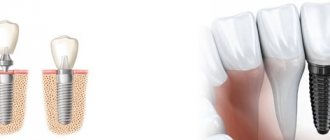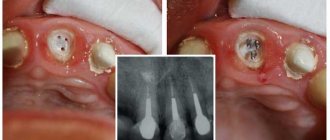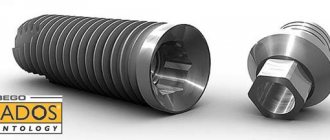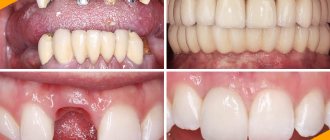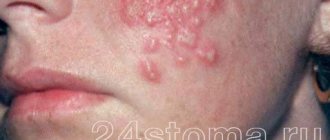Over the course of a month, serious hormonal changes occur in the female body.
General well-being and state of health largely depend on them. During menstrual bleeding, a woman often experiences severe discomfort, so some medical procedures and manipulations are contraindicated for her. Let's figure out whether it is possible to remove a tooth during menstruation? After all, this surgical operation is highly stressful and is not always easily tolerated by patients. At the Line of Smile dental clinic there is no clear policy not to operate on “these days.” But we always try to take into account the cyclical nature of women’s physiology, since surgery during menstruation can negatively affect further wound healing. Therefore, it is important for the client to be honest during the consultation with the doctor and not be embarrassed to ask to reschedule the planned operation. However, if an x-ray shows that there is an infectious focus, removal is carried out on an emergency basis, regardless of what day of the menstrual cycle we are talking about.
Features of the menstrual cycle
Before we figure out whether it is possible to treat (tear) teeth during menstruation, let’s find out what, in fact, is the peculiarity of this phase of the cycle. Despite all its naturalness (after all, every healthy woman of childbearing age undergoes regulation), this physiological process is not the most favorable period for visiting a dental office.
During menstruation, many changes occur in a woman’s body - coagulation decreases, and, consequently, the composition of the blood is modified. With the regulation, immunity is significantly reduced, which increases the risk of various infections. May also be of concern:
- headaches of varying intensity;
- severe fatigue;
- increased sweating;
- severe nausea (sometimes even accompanied by vomiting);
- dizziness, etc.
These days, heavy lifting, exercise, sports, hypothermia/overheating and nervous shock are strictly not recommended. Obviously, a visit to a dental clinic can hardly be called a pleasant event. Therefore, experts unanimously do not recommend treating, much less pulling teeth during menstruation, or performing any operations related to violations of the integrity of gum tissue.
Diagnosis of a disrupted menstrual cycle
Many women who have problems with menstruation put off visiting the doctor because they are afraid of prescribing hormone therapy. In fact, hormones are indicated only in some cases, and careful diagnosis is necessary to select an adequate treatment regimen.
In addition to a gynecological examination, smear and general blood and urine tests, the following may be prescribed:
- Ultrasound of the pelvic organs and thyroid gland;
- hormone analysis;
- hysteroscopy;
- studies to identify chromosomal pathologies;
- PCR, etc.
The doctor decides exactly what tests are needed after a detailed questioning, in which he can find out the presence of a genetic predisposition, features of the patient’s lifestyle and other nuances that affect the frequency and intensity of menstruation. You may also need to consult doctors of other specialties (endocrinologist, therapist) and additional studies (computed tomography, skull radiography, etc.).
Menstruation and toothache
Bleeding and swelling of the gums during menstrual periods is a fairly common occurrence. Which is understandable, given the numerous hormonal changes that occur during this period in the female body.
There are painful sensations so strong that the question of whether it is possible to treat teeth during menstruation is not even considered.
Of course, a woman should warn her doctor about the presence of menstruation. As mentioned above, many experts recommend postponing complex dental procedures during this period. Perhaps the doctor will select treatment and analgesics that will help reduce pain, but will delay the need for surgical intervention until the regulation is completed.
Ability to postpone deletion
The option to postpone deletion appears in several cases:
- The tooth does not hurt, does not bleed or is inflamed
- A woman feels unwell and complains of severe abdominal pain.
- The patient has low blood pressure
- The date of removal coincided with the first day of menstruation
It is better to postpone visiting a doctor during your period unless there is an urgent need for it.
In these cases, it is safer to wait 3-4 days rather than perform surgical procedures, which may be difficult for the girl.
If a patient comes to the clinic with acute pain, the doctor may recommend taking an Analgin or Ketanov tablet, or using folk remedies that relieve toothache (rinsing with a soda-salt solution, chamomile solution).
Procedures allowed on critical days
Menstruation is not a death sentence. And if the answer to the question of whether it is possible to pull out teeth during this period is clearly negative, then there are a number of dental procedures, the result of which does not depend on the menstrual cycle. Of course, the feasibility of carrying them out, first of all, depends on the woman’s well-being. But if necessary, you can do:
- General examination of the oral cavity. This procedure does not have the slightest contraindications during menstruation. If the teeth are in order, there will be no unpleasant sensations during the examination. In case of existing violations of the dental crowns, aching pain may appear during probing, which goes away very quickly. The doctor will prescribe the necessary medications that will temporarily relieve the pain. And a woman, during a more favorable period of the menstrual cycle, will be able to cure her teeth without any complications or discomfort.
- Teeth cleaning. This manipulation lasts on average 30-60 minutes. Manipulations can be carried out using ultrasound or soda emulsion. Both methods are absolutely painless, any discomfort is minimized. The result of cleansing also does not depend on what period of the menstrual cycle it was carried out.
- Remineralization. Saturation of teeth with calcium is indicated in the early stages of caries and with a lack of microelements responsible for the hardness of the enamel. To achieve the desired result, it is necessary to conduct several sessions, repeated at certain intervals. If some of them take place during critical days, this will in no way affect the result or the patient’s well-being.
But when it comes to a disturbing wisdom tooth, it is better to postpone removal, giving preference to treatment. This procedure is very painful and is only performed under anesthesia. During menstruation, the pain threshold is significantly reduced, and the effect of anesthesia is weaker compared to other days of the cycle. After the operation, healing will be slow, and the wound may bother the woman for a long time.
Use of anesthetics
All surgical procedures are performed by Smile Line doctors using highly effective modern anesthetics. This guarantees the absence of pain during tooth extraction and makes the procedure as comfortable as possible.
Usually, when working with the first to fifth teeth, infiltration anesthesia is used. The dentist gives an injection, after which a separate area of the oral cavity “goes numb” and becomes insensitive. If it is necessary to pull out the sixth, seventh or eighth molar, the roots of which are very large and deep, they resort to conduction anesthesia.
Sealing
Filling teeth during menstruation is not contraindicated. Neither enzymatic nor hormonal transformations that occur during menstruation in a woman’s blood affect the quality of adhesion of the filling material to hard tissue. The risk of filling failure these days is no higher than during any other period of the cycle.
However, there are a number of reasons why it is better to postpone even such a procedure as filling.
- if the patient has caries of the second degree or higher;
- manipulations cannot be performed without anesthesia;
- there is a need for drainage;
- there is inflammation that can only be eliminated with antibiotics;
- there is a risk of infection;
- requires the use of multi-stage complex therapy.
In other cases, when there are no complications or risks, the dentist can perform a filling, despite the fact that the patient is menstruating.
In what cases can dental treatment be postponed?
Doctors at the TopSmile aesthetic dentistry clinic are specialists with more than 12 years of experience. They regularly improve their skills in Russia and abroad, successfully apply knowledge in practice and will not expose patients to undue risk. Diplomas, licenses, and certificates of dentists are posted on the website.
Is it possible to remove a tooth during menstruation? Depends on the patient's condition. Before the procedure, your dentist will ask you what stage of your menstrual cycle you are in. It is important to answer this question honestly. During menstruation, the composition of the blood changes. The number of red blood cells, platelets and hemoglobin decreases. Because of this process, medications may not work, anesthesia may not work, and a blood clot may not appear in the socket. The latter is especially dangerous. After all, a blood clot protects against infection.
You can postpone tooth extraction if the patient:
- caries without inflammatory process;
- dystopic teeth or those that are located out of place;
- teeth that interfere with prosthetics.
Note. During menstruation, take care of yourself and try not to catch colds. In case of ARVI, tooth extraction is not performed, which means the planned operation will have to be rescheduled.
Prosthetics
A dental operation such as prosthetics is a rather complex, multi-stage process. Most of the manipulations can be carried out without any fear during critical days. In particular, we are talking about:
- preparatory procedures;
- taking jaw impressions;
- trying on plaster mass;
- correction processes;
- installation of prostheses.
But it is better to postpone the final stage of screwing the pin directly into the jawbone until the end of your period. Poor blood clotting, which is inherent in many women in this phase, can lead to a number of unsafe consequences and complications. For the same reasons, it is necessary to exclude, if possible, the removal of old dentures during menstruation.
Indications for removal:
- a painful tooth provokes the development of a cyst, negatively affects the function of the trigeminal nerve, causing its inflammation;
- abnormal position of the tooth, improper eruption, which affects the bite;
- constant injury by the edges of the crown of the mucous membrane, tongue due to the abnormal size of the tooth or its shape - this factor also affects the bite;
- multi-rooted teeth that provoke inflammation of the cyst - osteomyelitis;
- chronic inflammatory processes – periodontitis, impossibility of non-surgical treatment;
- advanced caries complicated by pulpitis, periodontitis, neuritis or odontogenic osteomyelitis.
After carrying out diagnostic measures, the doctor identifies the causative tooth and prescribes its removal. This happens in one session under local anesthesia.
Taking an X-ray
Many people consider the X-rays used to perform the procedure to be very harmful. Most prejudices are associated with the negative impact of x-rays on the menstrual cycle. Therefore, many women are afraid of this manipulation during menstruation.
In fact, all experiences are completely groundless. X-rays are directed exclusively to the area of the gum where the root of the diseased tooth is located. The woman’s body, in particular the pelvis, is reliably protected by a special coating. The specialist takes the picture instantly; no radiation can cause harm in such a short period of time. Therefore, no contraindications or features of the use of this type of diagnosis during the period of regulation have been discovered to this day.
H2 Erupted eights - what to do with them?
If wisdom teeth have grown in before the bite correction begins, this is the best option. When planning orthodontic treatment, the picture is clear: you can install braces or aligners and expect that the teeth will move strictly according to the planned pattern.
At the same time, it is generally undesirable to remove any teeth (even eights, even fangs) in order to free up space in a row of teeth. It is much better to save all the teeth and expand the space in the jaw using braces or aligners.
The principle here is this: the more teeth are preserved, the more tooth roots are in the jaw. And the roots of the teeth are a kind of support that protects the bone tissue from thinning.
General recommendations during menstruation
If a woman nevertheless decides to visit a specialist, she should know how to behave before and after dental procedures. So:
- It is better to visit the clinic during the day - any manipulations, including tooth extraction, are easier to tolerate before 15.00;
- to avoid excessive salivation, food should be taken no earlier than three hours before a visit to a specialist, you should also completely stop smoking, alcohol is strictly prohibited;
- You cannot take any painkillers on your own;
- upon completion of the procedure (especially if tooth extraction has taken place), overheating or hypothermia must be avoided so as not to cause bleeding;
- physical activity, a hot shower or bath are undesirable these days, and after a visit to the dentist they are completely contraindicated;
- Be sure to follow all instructions of the attending physician.
A woman who decides to have dental treatment during menstruation must measure her blood pressure before visiting the dentist - these days it may be lowered, as well as the pain threshold. These factors during manipulation can negatively affect the general condition of the patient, even fainting is possible.
It is important to inform the doctor about all existing manifestations and ailments so that he can make a decision as to whether it is possible to treat teeth these days or whether it is better to wait.
Possible complications after oral surgery
Any doctor will tell you that procedures such as dental implantation during menstruation, as well as root removal, are extremely undesirable. Also, sinus lifting and bone grafting cannot be performed. You need to understand that these are surgical procedures that inevitably involve traumatic and medicinal effects on the tissue. A woman’s body is weakened during her menstrual period; accordingly, such procedures can lead to negative consequences, and the rehabilitation period will not be entirely smooth.
Bleeding that won't stop
This is caused by poor blood clotting during menstrual periods. And even minimally invasive procedures, when, for example, implants are installed through a puncture in the gum, do not exclude such a development of events, since in the process the doctor acts on small vessels and capillaries.
“Once I had to pull out a tooth during my period. Honestly, I didn’t even think that this could affect the outcome of the operation. The doctor didn’t say anything, I didn’t ask him myself. But I repeat, I didn’t think that this was fraught with anything. And it wasn’t the first time I deleted it. Before this everything was fine. True, it never happened on a red day of the calendar. And then on the second day such swelling appeared, dear mother!! And it hurt for a long time, but the pills were almost of no use. In general, the ability to open my mouth without pain and not hide my face from others that time returned to me for an unusually long time. When I read about this, I realized that the reason was most likely menstruation...”
A.K., fragment of a review from the dental portal gidpozubam.ru
Increased recovery time after intervention
This is facilitated by reduced immunity and, again, prolonged bleeding. Plus, bleeding, in turn, not only further weakens the body, but also prevents the formation of a clot, which protects the fresh wound from external influences, saliva, pieces of food and bacteria. As a result, the tissue healing process slows down, the rehabilitation period is extended, and the operated tissue can easily become infected.
Expert opinion
Aida Vladimirovna Dzhutova
Specializations: Implant surgeon
Experience: 10+
“Treatment, and especially the removal and implantation of teeth during menstruation, are not recommended, although there is no explicit prohibition on their implementation and there is no clear instruction not to operate on these days. This already depends on several factors. The first is the responsibility and professionalism of the doctor, who, even at the stage of preparation, in particular for surgical procedures, must collect an anamnesis, carefully plan everything, focus on the nuances and warn about possible risks. The second is the attitude of the patient himself, because if a woman does not reschedule her visit to the clinic and does not clarify this point, then there seems to be no problem, but there may be unpleasant consequences, which should not be surprising.”
Formation of blood clots
This phenomenon is more rare than bleeding. However, it cannot be excluded in women with chronic diseases and a tendency to vascular pathologies. Surgery in such cases can trigger the process of increased platelet production and the formation of clots in the vessels, blocking the access of oxygen and nutrients. This situation can be fatal in extreme cases.
Intraosseous hematoma
Impaired blood clotting during menstruation is again to blame for the formation of such a pathology. The problem may arise in patients who have implants installed. In the near future after the operation, the blood does not clot, but begins to accumulate at the point of contact of the implant with the bone, which interferes with the full process of its osseointegration (engraftment, fusion with bone tissue cells). As a result, there is mobility of the implant, the need to remove it and reinstall it again.
Rejection of implant systems
One of the most unpleasant consequences that can result from dental implantation during menstruation is inflammation of the tissues surrounding the installed implant, peri-implantitis and mucositis. All this occurs due to weakened immunity, bleeding, altered hormonal levels, and the body’s low ability to quickly restore tissue during menstruation.
If mucositis detected in time is quite easily treated with preservation of bone structures and the implant itself, then peri-implantitis is fraught with rejection of structures and loss of bone tissue. At best, with these complications, you will throw a lot of money down the drain, at worst, you will harm your health, which will then require even greater costs and a lot of time.
Alveolitis and its complications
Also due to the risk of developing a pathology such as alveolitis, dentists do not recommend removing a tooth during menstruation. Alveolitis means inflammation of the socket of an extracted tooth, which is often complicated by suppuration, and in advanced cases, an abscess, gumboil, and phlegmon. The causes of the pathology again lie in the body’s susceptibility and weak resistance to various infections, prolonged bleeding, slow tissue regeneration, the absence of a blood clot on the wound and the formation of a “dry” socket.
Rejection of filling materials
Some experts do not rule out that, against the background of hormonal disruption that occurs during menstruation, the body is likely to reject some filling materials, as well as intolerance to the medications used during treatment. As a result, a woman may experience an allergic reaction. What other consequences? Restorations and fillings will not last long, they will quickly crumble, may fall out, and their seal will be broken, which will increase the risk of developing re-inflammation under the filling.
Is it possible to use anesthesia during menstruation?
Any surgical intervention, including when it comes to tooth extraction or gum surgery, is not complete without pain relief. Anesthesia in dentistry can be either general or local. In the first option, which is used in rare cases, the patient must undergo many tests, the results of which will determine the possibility of the procedure.
Local anesthesia is more common and safer. But it is worth considering that manufacturers often add adrenaline, which is a vasoconstrictor, to anesthetics. It significantly prolongs the duration of anesthesia and provides more precise localization of pain relief.
During regulation, PMS, and menopause, adrenaline can cause various adverse reactions in the patient, for example:
- increase or decrease in blood pressure;
- dizziness;
- nausea, vomiting;
- numbness in arms, legs, etc.
Usually, the ailments go away within 10–15 minutes, but the woman must definitely warn that she is currently undergoing regulation. There are often cases when anesthesia during menstruation does not work at all. This is another explanation for the negative answers of many doctors to the question of whether it is possible to pull teeth during this period of the cycle.
What procedures are acceptable?
During menstruation, it is generally not recommended to perform surgical interventions in the oral cavity. When it comes to dental prosthetics, it is permissible in cases where the main large-scale and most invasive procedures have already been carried out (nerve removal, tissue preparation, installation of pins, gum retraction, implantation).
Without fear of harm to health, you can take impressions of the jaws, try on and adjust dentures, take x-rays, install braces, carry out fluoridation and remineralization, as well as treat superficial and initial caries.
On a note! Of course, if you go to the clinic to treat ordinary caries or carry out non-invasive procedures provided you are in good health, for example, professional hygiene, teeth whitening, nothing bad will happen. However, you need to be prepared for possible consequences: increased discomfort in the dentist’s chair, hypersensitivity of enamel and mucous membranes, bleeding gums during and after procedures.
When is it definitely worth going to the dentist?
Despite the numerous risks listed above, there are situations when it is not advisable to postpone a visit to the dental office. It is advisable to contact a dentist in cases when:
- there is severe, acute pain that cannot be tolerated;
- suppuration has occurred on the gum or under the outer shell of the tooth;
- soft tissues in the mouth are swollen;
- gums bleed heavily;
- there are symptoms indicating an abscess above the periosteum (flux);
- a cyst has formed.
In addition, a woman during menstruation does not need to refuse to visit the dentist if she cannot go to the doctor on a pre-planned day due to an urgent business trip, a long trip, or any other event. The patient must inform the dentist that she is undergoing adjustments so that the specialist can correctly diagnose and select medications. It is possible that in such a situation the doctor will not provide complete treatment, but will only eliminate painful symptoms and prescribe therapy that allows you to postpone more serious procedures for some time.
For example, if there is debilitating pain, an inflammatory or purulent process is occurring, the dentist will professionally clean it, apply a special medicine to the disturbing tooth, and install a temporary filling. And more complex measures, such as removing nerves, cleaning canals, or tooth extraction, should be carried out later, when menstruation ends.
If you can't postpone your visit
Even if the visit was scheduled in advance, it will have to be canceled if you feel unwell. It would be blasphemy to go to the dentist with general weakness, severe pain in the lower abdomen, nausea and fear. If a woman is horrified by the mere thought of pain relief, drilling and filling, she needs to call the clinic and cancel the visit.
Reference! Delaying treatment for 3-4 days cannot significantly affect the further course of treatment and the likelihood of complications.
However, there are situations that require an immediate visit to the doctor. This, for example, is severe pain that is not eliminated by pills, swelling of the cheek, abscess and other inflammations. In these cases, every hour counts, so the most reasonable solution is to come to the appointment and ask the doctor if it is possible to limit yourself to only a visual examination.
Contraindications
Women are, of course, not prohibited from visiting the dental office during menstruation. Most dental procedures - cleaning, removal of stones on the surface of the teeth, filling, remineralization - are quite successful and without risk to the health of patients. The main thing is to be extremely frank during this period with your doctor and adhere to all his recommendations.
A contraindication, which, however, can be disputed in a number of cases, is only tooth extraction during the period of regulation. Since a reduced level of blood clotting during this period in women can cause bleeding and other complications.
Folk remedies for pain relief
In order to wait for the end of your critical days as painlessly as possible and, as a result, a postponed visit to the dentist, you can use home methods designed to alleviate the symptoms of dental ailments. The following methods are recommended by many dentists:
- Rinse with saline and soda solutions. You need to boil water, cool it, add soda or salt at the rate of 1 teaspoon per glass, and rinse every one and a half to two hours. You need to continue the procedure for several days in a row until the painful symptoms completely disappear.
- Lotions with mumiyo. This product perfectly disinfects the oral cavity and relieves inflammation. The lotions can be applied to both the diseased tooth and the gums, and kept in the mouth for a maximum of 5 minutes. It is optimal to repeat the procedure every hour and a half, but no more than 10 times during the day.
- Chewing dry propolis or rinsing with an alcohol solution from this product. Action – analgesic, anti-inflammatory. Propolis has the unique property of “sealing” small cracks and holes in teeth.
- Tampons with essential oils (clove, fir). Apply a few drops of oil to a piece of cotton wool and apply to the disturbing area. Essential oils will improve your general condition and reduce pain.
- Rinse with decoctions of chamomile, calamus (root), calendula or sage. To do this, pour 20 grams of any of the herbs with 200 grams of boiling water; to enhance the effect, you can additionally boil the infusion in a steam bath. After preparation, strain the mixture, cool and rinse your mouth every hour.
These methods can be used at any period of menstruation, but should not be abused. At the end of menstruation, a woman must see a dentist.
